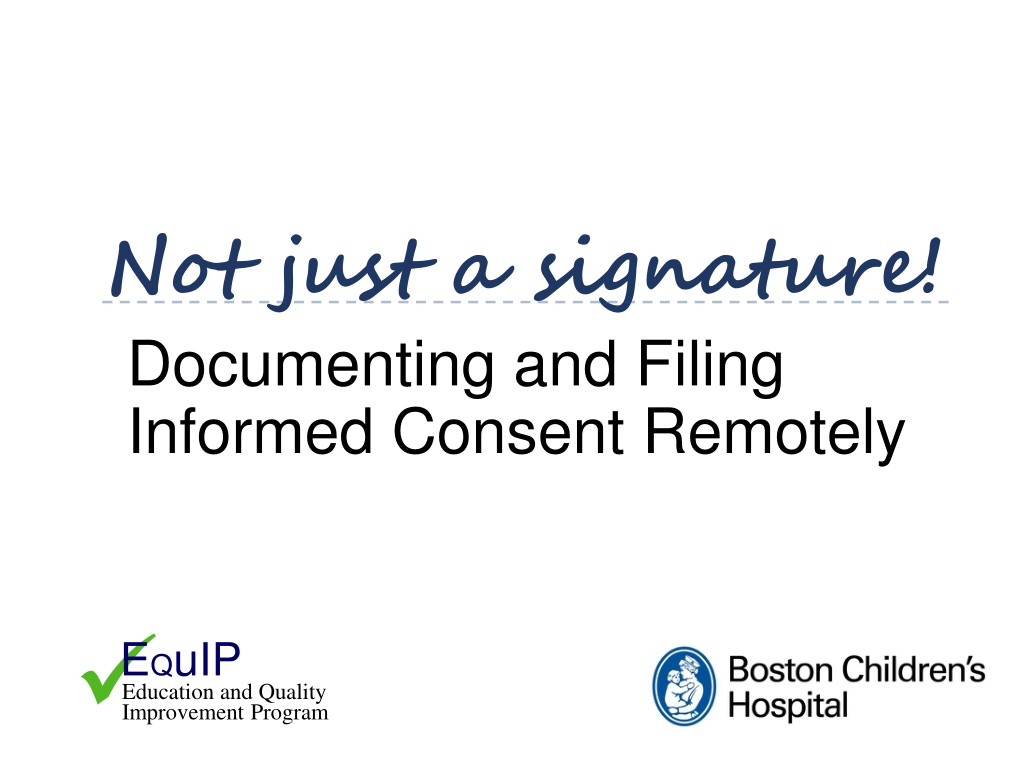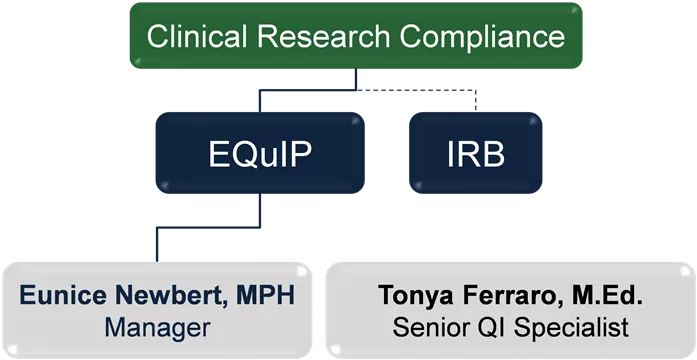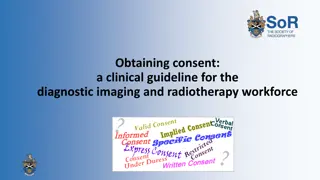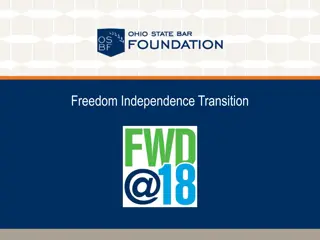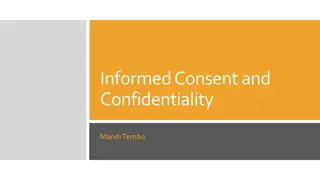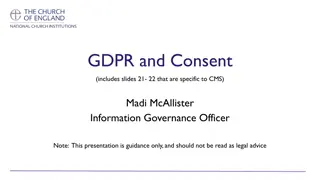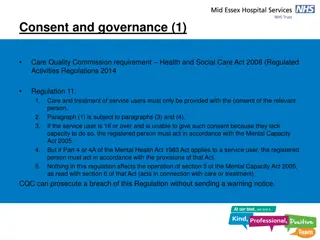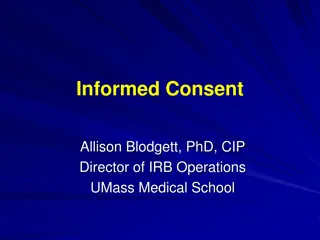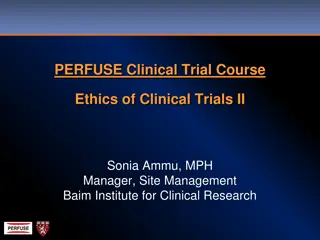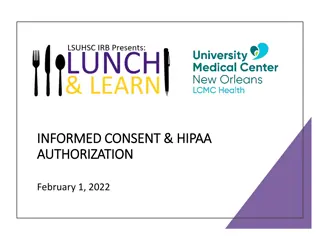Enhancing Informed Consent Procedures Remotely with EQuIP Program
Utilizing the Education and Quality Improvement Program (EQuIP), this initiative aims to enhance informed consent processes remotely by evaluating research practices, providing education and services for compliant research, and focusing on methods of obtaining, documenting, and filing signed consent documents effectively.
Download Presentation

Please find below an Image/Link to download the presentation.
The content on the website is provided AS IS for your information and personal use only. It may not be sold, licensed, or shared on other websites without obtaining consent from the author. Download presentation by click this link. If you encounter any issues during the download, it is possible that the publisher has removed the file from their server.
E N D
Presentation Transcript
Not just a signature! Documenting and Filing Informed Consent Remotely EQuIP Education and Quality Improvement Program
EQuIP: Education & Quality Improvement Program Program Purpose to educate the research community of applicable regulations, institutional policies and of good clinical practices pertaining to the protection of human subjects Contact Info Clinical Research Compliance EQuIP IRB Program Services Internal Study Audit/Review New/Transfer PI Training Study Tools and Templates One-on-one Assistance Education Talks/Presentations Eunice Newbert, MPH Manager Tonya Ferraro, M.Ed. Senior QI Specialist phone: 617-355-5308 email: eunice.newbert@childrens.harvard.edu tonya.ferraro@childrens.harvard.edu web: www.childrenshospital.org/research-and- innovation/research/research-administration/equip
Program goal 1. What are we doing? Evaluate research practices alongside the approved protocol, applicable regulation and BCH policies. Determine what works and what needs improvement 2. What can we do to help? Provide education and services to facilitate compliant research based on what we learn 3
Helping our Research Coordinators 1. Study Tools and Templates Click: EQuIP Site_Tools and Templates 2. One-on-one consult or just reach out by email or phone 3. Webinar series with IRB 4
Objectives Overview of consent process Methods of obtaining consent Documenting the process - to accurately reflect what actually happened - demonstrate compliance with process Filing signed consent document * Will focus on IRB-approved, written consent document 5
Informed Consent Process Informed consent is not just a signature on a form it is a process of mutual communication throughout the study 1. Presentation of research information for subject/family to review manner and location that ensures privacy 2. Discussion which allows the subject/family to ask questions or express concerns, and the investigator to respond as well as ensure subject comprehension 3. Adequate time for subject/family to consider 4. Documentation of subject/family voluntary consent 6
Informed Consent Process 1. Provide copy of the consent document to all required parties with adequate time for each to review the document prior to the consent discussion Subject/legal guardian: main consent form Child subject: if a separate assent form is required, the child must receive a copy of the assent form Interpreter: if English is not the primary language of the subject and/or legal guardian, an interpreter should be identified prior to consent discussion 7
Informed Consent Process 2. Schedule consent documentation 3. Consent-discussion (real-time) PI/authorized staff provides an overview of the study and reviews the consent document with subject/guardian Subject/guardian able to ask questions 4. Signatures 5. Complete consent process (distribute copies and file as required) 6. Document Process 8
Methods for Obtaining Written Consent 1. In-person (physically face-to-face) IRB policy: General Information: Informed Consent and Parental Permission 2. Remotely (physically apart, but conversation in real-time) IRB policy: Remote Consent: Process and Documentation 9
Where to file Informed consent 1. Copy of signed consent to Subject/Family 2. Original in PI study records 3. Copy of signed consent in Medical Records if required
How do I determine when a signed consent form should be uploaded in subject s Medical Records? Always check approval letter and verify in CHeRP. If there is any question, contact IRB analyst to clarify 1. If required, ensure process is in place 2. If NOT required, ensure the process prevents a signed consent going into medical record (there is usually a reason the IRB will specify consent should not go in) once uploaded, cannot be removed. Can be hidden 3. Recommend to know where to consent form is filed (does research staff know where to find it in medical record if requires) 4. Reference IRB policy: Storage of Research Data and Informed Consent Documents 5.
How to upload to Medical Records All research consents that need to be sent from the following campuses should be in an interoffice envelope labeled Medical Records Boston. Drop off locations at the satellites/campuses are as follows: Lexington: 2nd floor Pediatric clinic Peabody: Front registration desks on the first floor or second floor Waltham: Front desk in the 2 East work room In the event that Medical Records cannot scan your documents for any reason they will need to have a contact name and number. Please make sure that the research consents are sent with a post-it note attached that indicates where the documents are from and a call-back number where Medical Records can reach you in case they have questions for you about the documents.
